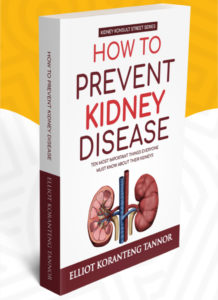How to prevent kidney disease: Book review
 Chronic kidney disease, also known as chronic kidney failure, is the gradual loss of kidney function, says Dr Nsiah Asare of the Ghana Health Service.
Chronic kidney disease, also known as chronic kidney failure, is the gradual loss of kidney function, says Dr Nsiah Asare of the Ghana Health Service.
According to Dr Akosua Ampomah Asomaning at the Renal Unit of the Korle-bu Teaching Hospital, most patients on dialysis (due to kidney failure) are under 40 years, and they need GH¢325.00 to attend one session of dialysis. She indicates that ideally, every patient needs three sessions per week, and this means every kidney patient needs GH¢975.00 every week to stay alive. It is therefore very difficult for the average Ghanaian to raise GH¢3,900.00 every month for dialysis.
In a manner that can easily pass for “being the change you want to see” Dr Elliot Koranteng Tannor, a Nephrologist, that is a medical specialist who looks after the kidneys, takes the bull by the horn to put together in 85 pages, a life-changing book to give enlightenment on how to prevent kidney disease.
Renal disease according to experts contributed to 10.8 per cent of deaths from 2010 to 2013 (Adjei et al., 2018). It is not uncommon to see on television screens and other news sources people from all walks of life appealing for funds to help them to pay for the cost of accessing treatment for various kidney-related issues.
Looking at the burden of kidney disease on the populace, and considering the high cost of managing the disease, Dr Tannor who has first-hand knowledge and experience with kidney disease patients, has dedicated a chunk of his life and resources, and made it a personal responsibility to ameliorate the suffering of many, not only by attending to them in the wards and his consulting room but also by going out of his comfort zone to ensure that people get informed on how to prevent kidney-related diseases.
In this 85-page book, Dr Tannor summarizes his purpose in these three lines:
“Things everyone must know about the kidney”
“The essential functions of the kidney” and
“How to prevent kidney disease and many more”
If one gets these three right, they probably wouldn’t be needing a doctor for any kidney-related issue.
Dr Tannor recognizes the need to be informed on exactly what the kidney is, and takes time to give simple explanations to what could have been a technically difficult subject for the average person to grasp.
The book is in three parts. The first part, in three chapters, explains in very simple English what the kidney is, and also delves into kidney disease in very simple everyday English. Reading this part will knock out a lot of the myths and street notions one might have had about kidneys, this part of the book will take away the fear of hearing anything about the kidneys and will keep the reader in awe about simple and yet accurate knowledge about what the kidneys and kidney diseases are, and he does so citing real life examples of cases and thereby, enabling the reader to have a feel of the reality and the fact that what is being talked about is no respecter of race, educational background, religion or economic status.
The second part of the book made up of six unique chapters on the function of the kidneys gets into the details of the actual work that kidneys do in the body, breaking down very complex medical terminologies into simply comprehensible language. This part of the book will keep you glued to its pages. This second portion also gives the book a universal character, one that can be read and understood even by Senior High School students.
Getting deep and deeper yet in very simple language on why some develop kidney problems, Dr Tannor touches on the use and abuse of herbal medicines, addresses the issue of what he describes as “strange therapies” that got everyone going bananas in Ghana some time ago. One of such therapies is “urine therapy” that got people drinking their pee in the early 2000s. He cautions that since what the kidney does is to remove toxins out of the body, drinking back that toxin literary is a killer. The author brings the role of the kidney out so alive that the reader gets to know how a basic thing as the colour and concentration of urine is a sign of needing to take in water for health purposes!
If a book can be described as a “blockbuster”, then this one is!
The third part of the book, (the first in the Kidney Konsult Street Series) contains what can be described as the ABC of kidney disease prevention. From point A to K, Dr Tannor enumerates simple health tips that will help the reader keep his or her kidneys healthy.
This section of the book begins with how to control one’s blood sugar level and ends with an important piece on “Know Your Family’s Medical History”.
The icing on the cake in this all-important book is a Glossary of 15 keywords that you are likely to hear when discussing “kidney-related issues”. The author explains these words in simple, understandable language.
In all, the book passes for the consumption of the general public.
By Sylvanus Gatorwu
